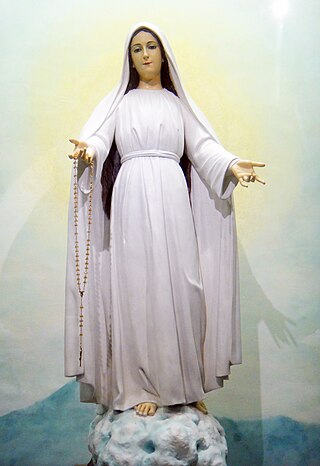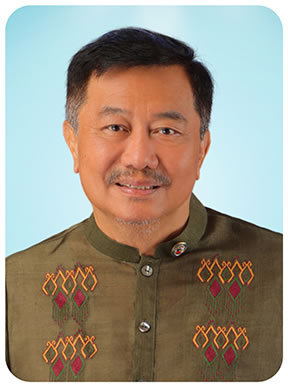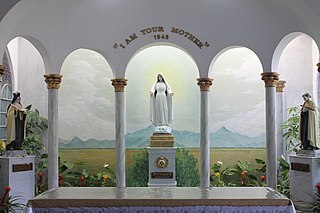
Iglesia ni Cristo is an independent nontrinitarian Christian church, founded in 1913 and registered by Felix Y. Manalo in 1914 as a sole religious corporation of the Insular Government of the Philippines.
Freedom of religion in the Philippines is guaranteed by the Constitution of the Philippines.
Reclusión perpetua is a type of sentence of imprisonment in the Philippines, Argentina, and several other Spanish-speaking countries.
Abortion in the Philippines is constitutionally prohibited. The constitutional provision that "[The State] shall equally protect the life of the mother and the life of the unborn from conception" was crafted by the Constitutional Commission which drafted the charter with the intention of providing for constitutional protection of the abortion ban, although the enactment of a more definitive provision sanctioning the ban was not successful. The provision is enumerated among several state policies, which are generally regarded in law as unenforceable in the absence of implementing legislation. The 1987 Constitution also contains several other provisions enumerating various state policies. Whether these provisions may, by themselves, be the source of enforceable rights without implementing legislation has been the subject of considerable debate in the legal sphere and within the Supreme Court.
Leah Lopez Navarro is a Filipino singer and activist. She was a prominent singer from late 1970s up to early 1980s. In April 1986, she was one among fifteen singers featured in the song, "Handog ng Pilipino sa Mundo" commemorating the People Power Revolution.
The Revised Penal Code contains the general penal laws of the Philippines. First enacted in 1930, it remains in effect today, despite several amendments thereto. It does not comprise a comprehensive compendium of all Philippine penal laws. The Revised Penal Code itself was enacted as Act No. 3815, and some Philippine criminal laws have been enacted outside of the Revised Penal Code as separate Republic Acts.
Rape in the Philippines is considered a criminal offense. In Philippine jurisprudence, it is a heinous crime punishable by reclusión perpetua when committed against women. Rape of males is also legally recognized as rape by sexual assault, which is penalized by imprisonment of six to twelve years.
Harriet Obias Demetriou is a Filipino lawyer and retired judge. She served as the chairperson of the Commission on Elections (COMELEC) from 1999 to 2001, the first woman to serve in that post. Prior to that, she was an associate justice of the Sandiganbayan, serving from 1995 to 1998. As presiding judge of the Pasig regional trial court, she presided over the trial for the murders of Eileen Sarmenta and Allan Gomez, in which Calauan, Laguna mayor Antonio Sanchez and his accomplices were convicted in 1995.

Mary, the Mediatrix of All Grace, also known as the Our Lady of Lipa, is an alleged Marian apparition that occurred within the Carmelite Monastery of Lipa, Batangas, Philippines. The event occurred to a former Carmelite postulant, Teresita Castillo. The original statue associated with the apparition is currently enshrined at the monastery.

The Cybercrime Prevention Act of 2012, officially recorded as Republic Act No. 10175, is a law in the Philippines that was approved by President Benigno Aquino III on September 12, 2012. It aims to address legal issues concerning online interactions and the Internet in the Philippines. Among the cybercrime offenses included in the bill are cybersquatting, cybersex, child pornography, identity theft, illegal access to data and libel.
In the Philippines, atheists and agnostics are not officially counted in the census of the country, although the Philippine Statistics Authority in 2020 reported that 43,931 Filipinos have no religious affiliation or have answered "none". Additionally, an undated study by the Dentsu Communication Institute in Japan claimed that around 11 million or 11% of Filipinos are irreligious. Since 2011, the non-religious increasingly organized themselves, especially among the youth in the country. There is a stigma attached to being an atheist in the Philippines, and this necessitates many Filipino atheists to communicate with each other via the Internet, for example via the Philippine Atheism, Agnosticism and Secularism, Inc. formerly known as Philippine Atheists and Agnostics Society.

Ernest John Uy Obiena is a Filipino pole vaulter. He is currently ranked world No. 3 in men's pole vault by the 2024 World Athletics Rankings.

Pantaleon Diaz Alvarez is a Filipino lawyer and politician serving as the Representative of Davao del Norte's 1st district since 2016, previously holding the position from 1998 to 2001. He served as the Speaker of the House of Representatives from 2016 to 2018. He also served as the Secretary of Transportation and Communications in the Cabinet of President Gloria Macapagal Arroyo from 2001 to 2002. He is a stern advocate to shift the current centralized set-up of the Philippines into a federal form, pushing for the establishment of an indigenous state in Luzon and an indigenous state in Mindanao. Initially in favor of an independent Mindanao, Alvarez changed stance when Rodrigo Duterte talked about a federal Philippines with him. In 2017, Alvarez proposed a new set-up to spearheaded federalism in the Philippines.

John Charles Edward "Carlos" Pamintuan Celdran was a Filipino artist, tour guide, segment TV host and cultural activist. He was known for "Walk This Way", a guided tour of the Manila districts of Intramuros, Binondo, and Quiapo using a combination of music, visuals, and history lectures to immerse tourists into what life was like during the Spanish and American colonization periods of the Philippines. He was also known for engaging in a controversial protest, known colloquially as his "Damaso stunt", in the Manila Cathedral in September 2010, leading to his arrest for "offending religious feelings" as per Article 133 of the Revised Penal Code. In January 2019, the conviction forced Celdran to go on self-exile in Madrid, Spain, where he died of cardiac arrest on October 13 of that year.

Offending religious feelings is a blasphemy law in Poland. According to Article 196 of the Penal Code: "Whoever offends the religious feelings of other persons by publicly insulting an object of religious worship, or a place designated for public religious ceremonies, is liable to pay a fine, have their liberty limited, or be deprived of their liberty for a period of up to two years."
Persona non grata, in the context of Philippine governance parlance, refers individuals or groups declared as unwelcome in a particular locality. This designation is merely symbolic and non-binding, and does not legally prohibit a person declared as persona non grata from stepping foot on that locality.

Amadeus Fernando Magallanes Pagente, better known by their stage name Pura Luka Vega, is a Filipino drag performer. They were a Drag Den contestant. In 2023, they came into public attention for a drag performance dressed as Jesus Christ to the tune of a remix of the Tagalog language version of the Lord's Prayer.
Tonimari Bauto Fowler is a Filipino actress, rapper and social media personality. Besides appearances on her social media profiles, Fowler also pursued a career in mainstream show business where she portrayed the role of Chicky in the ABS-CBN action series FPJ's Batang Quiapo.

In December 2022, Harriet Demetriou, a devotee of the Mary, Mediatrix of All Grace apparition, filed a criminal case against exorcist priest Winston Cabading for offending religious feelings, a violation under the Revised Penal Code. This complaint was made over his prior statements referencing the Marian apparition in a conference and an online show which the complainant perceived to be a mockery against the devotion.
Rosemarie Peñamora Tan-Pamulaklakin, also known as Rosmar, is a Filipino vlogger, entrepreneur, and CEO of the skincare brand Rosmar International. She has also ventured into other businesses, including a pet shop, a samgyupsal restaurant, a massage and parlor business, a thrift store, a fish store, and real estate.









